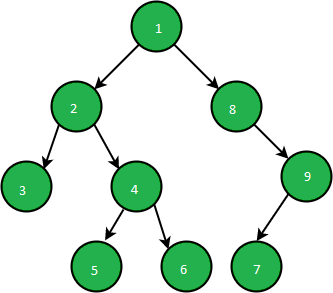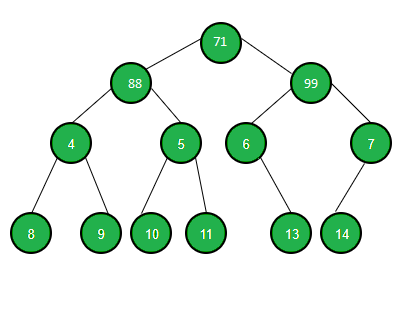给定一棵二叉树,任务是从左到右遍历给定二叉树的每个级别,并打印在该级别遇到的每个替代项。
例子:
Input:

Output:
1
2
3 9
5 7
Input:

Output:
71
88
4 6
8 10 13
方法:可以通过在给定的二叉树上执行Level Order Traversal遍历来解决该问题。请按照以下步骤解决问题:
- 初始化一个队列,以存储给定二叉树的每个级别的节点。
- 执行级别顺序遍历并从二叉树的每个级别打印备用节点
下面是上述方法的实现:
C++
// C++ program to implement
// the above approach
#include
using namespace std;
// Structure of a Node
struct Node {
int data;
Node* left;
Node* right;
Node(int val)
{
data = val;
left = right = NULL;
}
};
// Print alternate nodes of
// a binary tree
void PrintAlternate(Node* root)
{
// Store nodes of each level
queue Q;
Q.push(root);
while (!Q.empty()) {
// Store count of nodes
// of current level
int N = Q.size();
// Print alternate nodes of
// the current level
for (int i = 0; i < N; i++) {
Node* temp = Q.front();
Q.pop();
if (i % 2 == 0) {
cout << temp->data << " ";
}
// If left child exists
if (temp->left) {
// Store left child
Q.push(temp->left);
}
// If right child exists
if (temp->right) {
// Store right child
Q.push(temp->right);
}
}
cout << endl;
}
}
// Driver Code
int main()
{
Node* root;
// Create a tree
root = new Node(71);
root->left = new Node(88);
root->right = new Node(99);
root->left->left = new Node(4);
root->left->right = new Node(5);
root->right->left = new Node(6);
root->right->right = new Node(7);
root->left->left->left = new Node(8);
root->left->left->right = new Node(9);
root->left->right->left = new Node(10);
root->left->right->right = new Node(11);
root->right->left->right = new Node(13);
root->right->right->left = new Node(14);
PrintAlternate(root);
} Java
// Java program to implement
// the above approach
import java.util.*;
class GFG{
// Structure of a Node
static class Node
{
int data;
Node left;
Node right;
Node(int val)
{
data = val;
left = right = null;
}
};
// Print alternate nodes of
// a binary tree
static void PrintAlternate(Node root)
{
// Store nodes of each level
Queue Q = new LinkedList<>();
Q.add(root);
while (!Q.isEmpty())
{
// Store count of nodes
// of current level
int N = Q.size();
// Print alternate nodes of
// the current level
for (int i = 0; i < N; i++)
{
Node temp = Q.peek();
Q.remove();
if (i % 2 == 0)
{
System.out.print(temp.data + " ");
}
// If left child exists
if (temp.left!=null)
{
// Store left child
Q.add(temp.left);
}
// If right child exists
if (temp.right!=null)
{
// Store right child
Q.add(temp.right);
}
}
System.out.println();
}
}
// Driver Code
public static void main(String[] args)
{
Node root;
// Create a tree
root = new Node(71);
root.left = new Node(88);
root.right = new Node(99);
root.left.left = new Node(4);
root.left.right = new Node(5);
root.right.left = new Node(6);
root.right.right = new Node(7);
root.left.left.left = new Node(8);
root.left.left.right = new Node(9);
root.left.right.left = new Node(10);
root.left.right.right = new Node(11);
root.right.left.right = new Node(13);
root.right.right.left = new Node(14);
PrintAlternate(root);
}
}
// This code is contributed by 29AjayKumar Python3
# Python3 program to implement
# the above approach
# Structure of a Node
class newNode:
def __init__(self, val):
self.data = val
self.left = None
self.right = None
# Print alternate nodes of
# a binary tree
def PrintAlternate(root):
# Store nodes of each level
Q = []
Q.append(root)
while (len(Q)):
# Store count of nodes
# of current level
N = len(Q)
# Print alternate nodes of
# the current level
for i in range(N):
temp = Q[0]
Q.remove(Q[0])
if (i % 2 == 0):
print(temp.data, end = " ")
# If left child exists
if (temp.left):
# Store left child
Q.append(temp.left)
# If right child exists
if (temp.right):
# Store right child
Q.append(temp.right)
print("\n", end = "")
# Driver Code
if __name__ == '__main__':
# Create a tree
root = newNode(71)
root.left = newNode(88)
root.right = newNode(99)
root.left.left = newNode(4)
root.left.right = newNode(5)
root.right.left = newNode(6)
root.right.right = newNode(7)
root.left.left.left = newNode(8)
root.left.left.right = newNode(9)
root.left.right.left = newNode(10)
root.left.right.right = newNode(11)
root.right.left.right = newNode(13)
root.right.right.left = newNode(14)
PrintAlternate(root)
# This code is contributed by ipg2016107C#
// C# program to implement
// the above approach
using System;
using System.Collections.Generic;
class GFG{
// Structure of a Node
class Node
{
public int data;
public Node left;
public Node right;
public Node(int val)
{
data = val;
left = right = null;
}
};
// Print alternate nodes of
// a binary tree
static void PrintAlternate(Node root)
{
// Store nodes of each level
Queue Q = new Queue();
Q.Enqueue(root);
while (Q.Count != 0)
{
// Store count of nodes
// of current level
int N = Q.Count;
// Print alternate nodes of
// the current level
for (int i = 0; i < N; i++)
{
Node temp = Q.Peek();
Q.Dequeue();
if (i % 2 == 0)
{
Console.Write(temp.data + " ");
}
// If left child exists
if (temp.left!=null)
{
// Store left child
Q.Enqueue(temp.left);
}
// If right child exists
if (temp.right!=null)
{
// Store right child
Q.Enqueue(temp.right);
}
}
Console.WriteLine();
}
}
// Driver Code
public static void Main(String[] args)
{
Node root;
// Create a tree
root = new Node(71);
root.left = new Node(88);
root.right = new Node(99);
root.left.left = new Node(4);
root.left.right = new Node(5);
root.right.left = new Node(6);
root.right.right = new Node(7);
root.left.left.left = new Node(8);
root.left.left.right = new Node(9);
root.left.right.left = new Node(10);
root.left.right.right = new Node(11);
root.right.left.right = new Node(13);
root.right.right.left = new Node(14);
PrintAlternate(root);
}
}
// This code is contributed by 29AjayKumar 输出:
71
88
4 6
8 10 13
时间复杂度: O(N)
辅助空间: O(N)